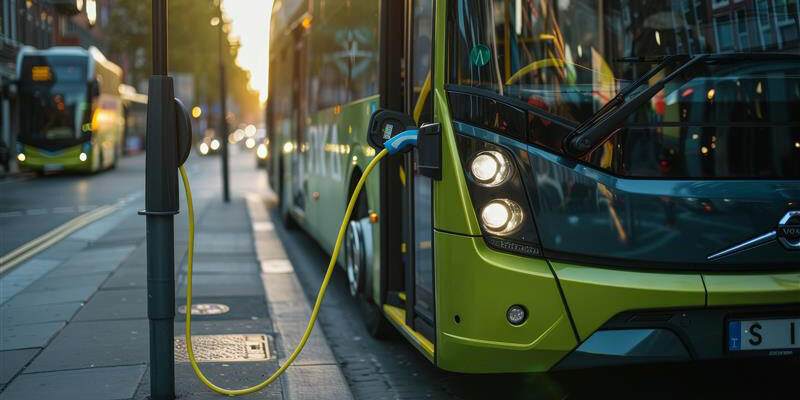World's first smart electric transit system is hitting the road
 Starting in early 2025, residents of the Ontario town of Bradford West Gwillimbury will be adopting a new, all-electric, door-to-door public transit system. Residents will be able to use a mobile app to get door-to-door rides anywhere in town at regular transit fares. Photo: Adobe Stock
Starting in early 2025, residents of the Ontario town of Bradford West Gwillimbury will be adopting a new, all-electric, door-to-door public transit system. Residents will be able to use a mobile app to get door-to-door rides anywhere in town at regular transit fares. Photo: Adobe Stock
The Ontario town of Bradford West Gwillimbury (BWG) will soon be adopting a new all-electric door-to-door public transit system.
Starting in early 2025, residents can use a mobile app to get door-to-door rides anywhere in town at regular transit fares. The service will connect directly with Ontario’s GO trains.
“Bradford West Gwillimbury’s transit solution will empower our residents and strengthen our community while positioning us for a sustainable future,” said Mayor James Leduc. “This approach enhances mobility for all residents, saving time and money while supporting our community building goals. We are thrilled to establish BWG as a model for sustainable urban growth.”
The system and app are designed in collaboration with Argo. Founded in June 2024, the company focuses on developing door-to-door services for public transit systems.
“Argo’s mission is to make public transit the easiest way to get around any city,” said a press statement from the company. “Starting with the Town of BWG, we’re showing how smart routing and electric vehicles can give everyone access to affordable, convenient transportation while helping municipalities reduce traffic, emissions, and noise.”
Residents can book door-to-door rides through a mobile app, with connections to GO trains and local buses. The system adjusts to demand in real-time and aims to reduce wait times and make transit more reliable than driving.
St. John’s Electric Buses
In Newfoundland and Labrador, the City of St. John’s is also making electric upgrades to its public transit system. St. John’s is purchasing new electric buses and upgrading Metrobus Transit’s facilities after a combined investment of over $50.3 million from the federal, provincial, and municipal governments.
“The transportation needs of our population are evolving quickly, and we have seen a significant increase in ridership for Metrobus,” said Mayor Danny Breen. “This investment into our fleet and infrastructure to support electrification will help build a more sustainable public transportation system that will better meet the needs of our residents, all while reducing our carbon footprint.”
The federal government is investing $22,852,237 in these projects through the Public Transit Stream of the Investing in Canada Infrastructure Program. The Government of Newfoundland and Labrador is investing $16,774,766, and the city is contributing $10,702,328.
The new buses include eight additional hybrid buses and nine zero-emission buses and will help Metrobus start phasing out diesel buses. The electric upgrades announced by Breen, MP Joanne Thompson, and provincial transportation and infrastructure minister Fred Hutton are aimed at reducing transit emissions and improving service for transit users in St. John’s.
“We recognize the importance of public transit in how users access and experience their towns and cities,” Hutton said. “It is incumbent upon all levels of government to help ensure public transit infrastructure is as environmentally friendly as it can be. This funding will help Metrobus in achieving that goal.”
In 2024, the federal government unveiled the Canada Public Transit Fund. The government says the fund will provide $3 billion per year of permanent funding for public transit and active transportation infrastructure, beginning in 2026-27.
Over 10 years from 2026, the City of St. John’s will receive up to $13,094,230 through the fund.
More Electric Buses in B.C.
More electric buses are also going to be on B.C. roads as the province’s main transit operator plans to add more electric vehicles to its fleet. BC Transit transports more than 57 million customers in communities across the province every year.
The company has updated its fleet acquisition strategy and plans to add over 900 new buses to its fleet over the next three to five years.
“While BC Transit works toward its goal of a zero-emissions fleet, the organization will continue to purchase a variety of buses,” BC Transit announced. “A mixture of bus propulsion and lower carbon fuel types will ensure that BC Transit has a reliable fleet that meets the growing demand for transit in the communities it serves.”
BC Transit has received funding for 141 electric buses, including 125 heavy duty, 10 high capacity (double decker), and six light duty. The first batch of these buses are on the production line and the first 10 electric buses are expected to arrive for use in the Victoria Regional Transit System starting early 2025.
In spring 2024, BC Transit shared news that it had placed orders for 66 of the 125 funded heavy-duty electric buses and was moving ahead to bring charging infrastructure to other communities in the province.
“Electrification of our fleet is a significant part of our plan to reduce GHG emissions and ensure a cleaner and healthier future for everyone,” said Erinn Pinkerton, president and CEO of BC Transit. “With other active procurements underway and work advancing on charging infrastructure designs in communities, it’s an exciting time for BC Transit and our partners.”
The corporation says it needs to acquire approximately 590 buses between 2026 and 2029 to replace aging buses. As service expansion needs are identified and approved, BC Transit estimates that a further 312 net-new buses could be required between now and 2029.
In Vancouver, regional transit operator TransLink is building its first bus depot that will be dedicated to battery-powered electric buses. Upon completion, slated for 2028, TransLink says the depot will have space to store, charge, and maintain more than 300 electric buses. MW
✯ Municipal World Executive and Essentials Plus Members: You might also be interested in Wes Guckert’s article: Bus rapid transit systems – A solution for greener, more sustainable communities.
Ibrahim Daair is staff writer at Municipal World.
Related resource materials:



